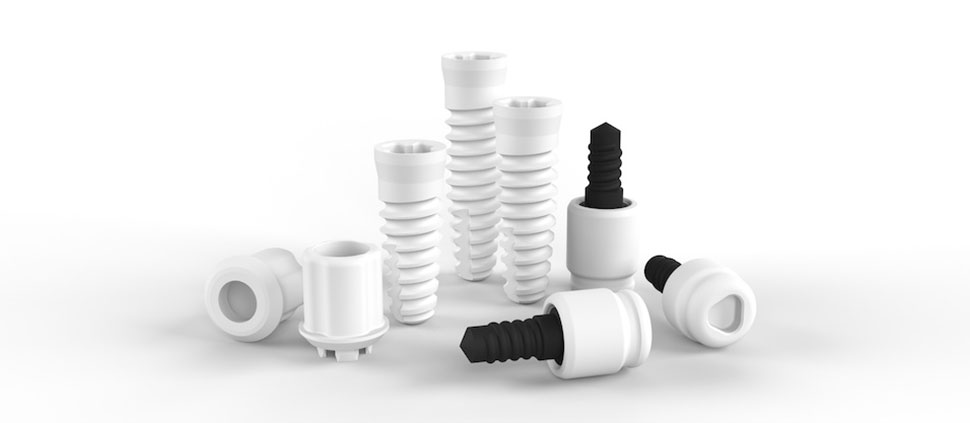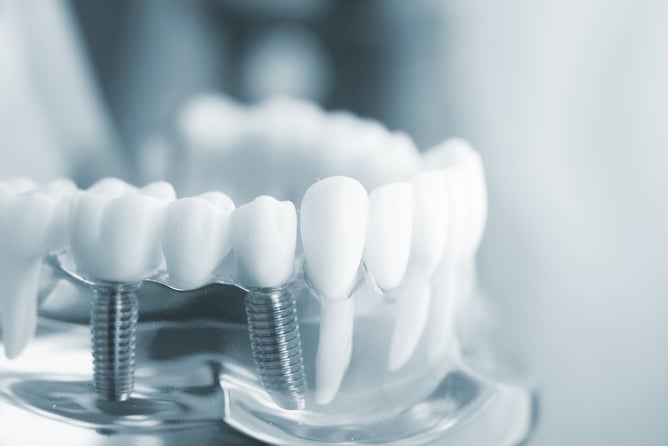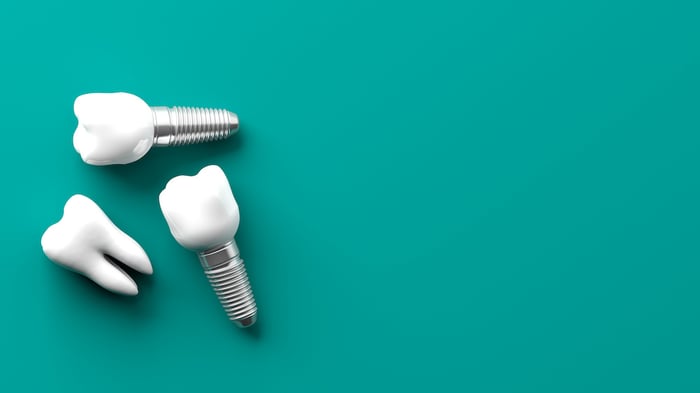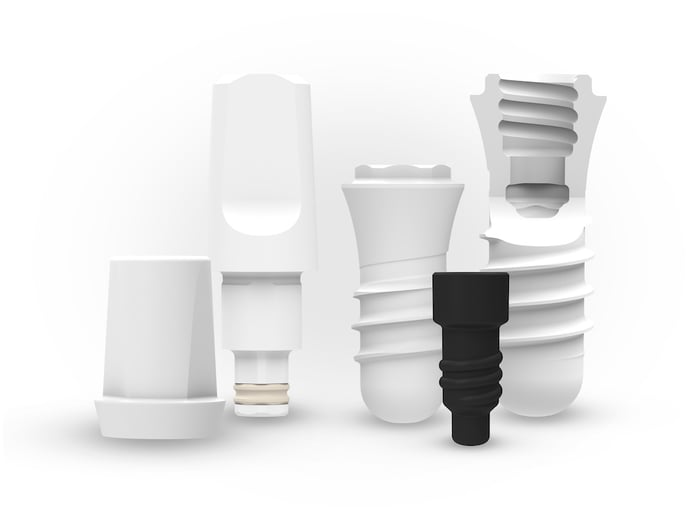
When Zirconia Implants Are Preferred To Titanium Implants
Zirconia implants or titanium implants? Dental implants are one of various options - along with dentures and bridges - to replace a missing tooth or few of them.
Why dental implants?
When you lose a tooth, it’s important to get the tooth replaced. Doing so prevents other teeth from shifting, which can result in problems such as gaps and misalignment. All this affects how you chew or smile.

Dental implants are a permanent solution to missing teeth. Shaped like small screws and surgically inserted into the jawbone, they function like your natural tooth root to which an artificial tooth can be attached.
Dental implants do not require neighbouring teeth as scaffolding (unlike bridges); they are more secure and last longer than dentures. They also help to strengthen the jawbone.
Dental implants can be made of titanium, or zirconia, which is a type of ceramic. So which is more suitable?
Zirconia implants vs Titanium implants
TITANIUM IMPLANTS
Used since the 1960s, titanium implants remain the most common type of dental implant with a success rate of more than 90%. It also offers myriad options according to angulation, size and purpose.
Since titanium is blackish-grey, the root of the dental implant could be visible above your gum line, especially if you have thin or receding gums. This can prove unsightly - marring an attractive smile and drawing attention to your dental implants. Due to its hue, titanium implants can also cause your gums to appear grey.

Another point to note is that titanium implants aren’t for everyone. Those sensitive or allergic to titanium might develop itchiness and other inflammatory reactions, which may cause bone loss and failure of the implant to successfully integrate into the jawbone.
Patients with autoimmune conditions such as rheumatoid arthritis, Crohn's disease, and diabetes may also experience local inflammation and irritation brought about by titanium implants.
Consumers have become increasingly wary of using metals in dental work. Studies have shown that metals used in dental and surgical implants can enter in small amounts over time and accumulate in the body, and may cause organ damage, neurological problems, or even cancer.
Titanium can corrode in wet environments such as the mouth, causing a metallic taste. Some types of toothpaste can even make titanium leach faster.
Titanium implants have also been implicated in yellow nail syndrome, a rare condition characterised by symptoms such as a thickening and yellowing of the nails, bronchial obstruction, lymphedema, postnasal drip and cough-associated sinusitis.
ZIRCONIA IMPLANTS
Launched in 1987, zirconia implants are made of a material that combines the strength of metal with the heat-resistant properties of ceramic.
It’s ideal for dental implants as it’s bio-inert, meaning it won’t corrode, trigger chemical reactions, or migrate to other sites. Being hypoallergenic, there’s no risk of itchiness or inflammation.
(Watch the video where Dr Samintharaj Kumar compares zirconia and titanium implants below)
While zirconia is not as strong as titanium, it’s very durable and considered superior to other ceramics in terms of fracture toughness. Its extremely smooth finish means there’s less crevices for bacteria, plaque and calculus to take root. So, when compared to titanium implants, zirconia implants contribute to cleaner and healthier gum tissue and greater oral hygiene.
Aesthetics-wise, zirconia implants also enjoy an edge over titanium. Zirconia is white in colour so it looks and feels more like natural teeth. What’s more, it can be easily coloured to match your natural tooth colour — especially crucial when you need to replace a front tooth.
Caveats of zirconia implants
Being relatively new to the Singapore market, fewer dentists offer zirconia implants. The long-term performance and success of zirconia implants have yet to be proven; they may have higher failure rates than titanium.
Since zirconia implants are not as strong, they may not last as long. Low-temperature degradation may occur as the product ages, resulting in reduced strength, density, and toughness of the material.
Compared to titanium implants, too, zirconia implants have limited options in terms of shape, size and versatility. They also often come in just one piece, unlike titanium implants that come in 2 pieces.
As such, zirconia implants are not suitable for complex oral rehabilitations or implant-supported dentures. They are not offered to patients who are missing all their teeth or need all their teeth replaced with implants.
ZERAMEX CERAMIC IMPLANTS: BEST OF BOTH WORLDS
 Developed in Switzerland, Zeramax ceramic implants are a pioneering two-part, metal-free implant solution. It combines the safety and stylish appearance of zirconia implants with the versatility of titanium implants.
Developed in Switzerland, Zeramax ceramic implants are a pioneering two-part, metal-free implant solution. It combines the safety and stylish appearance of zirconia implants with the versatility of titanium implants.
Highly biocompatible and corrosion-resistant, Zeramex ceramic implants are made of zirconium dioxide ceramic, which supports blood circulation in the gums, reduces inflammatory response and promotes bone resorption.
The stability and long life of Zeramex ceramic implants have been tested with excellent results. Zeramex ceramic implants offer a healing success rate of over 96% - these results have been proven in clinical applications.
Are Zirconia or Zeramex Implants Suitable For
Me?
If you are allergic to titanium, have an autoimmune disease, seek a metal-free dentistry solution or desire more natural-looking results, consider zirconia or Zeramex ceramic implants.
Consult our dentists today to learn more about zirconia implants. Call +65 6833 4353 or email hello@nuffielddental.com.sg for an appointment
.png?width=2223&height=447&name=Background%20(4).png)

-1.svg)



